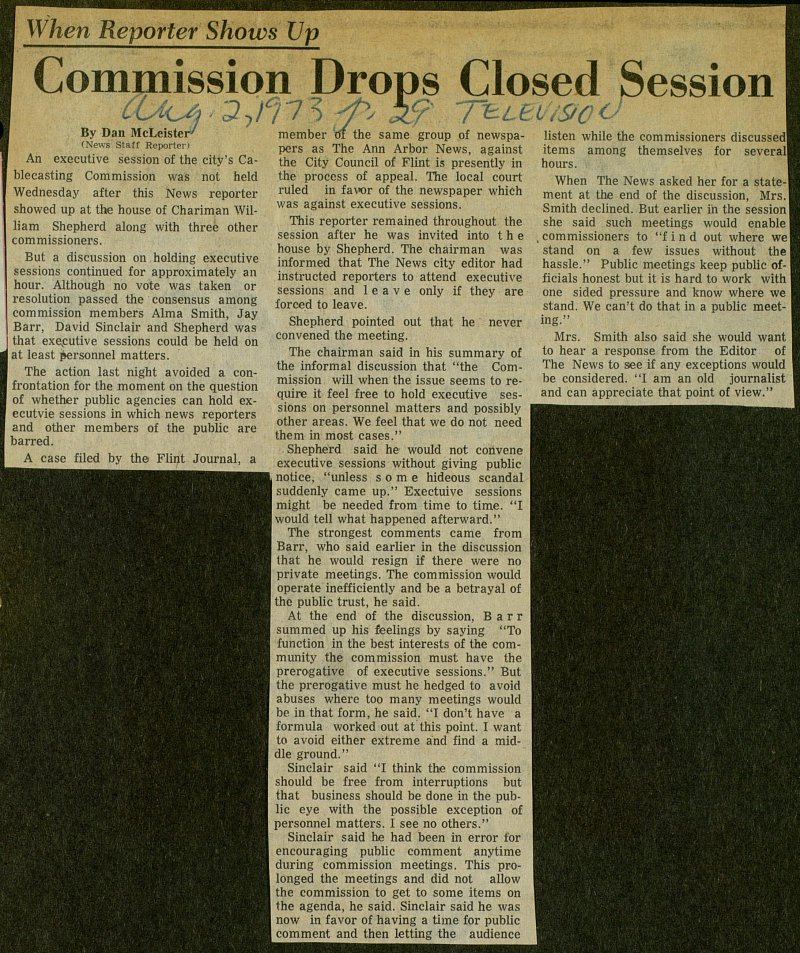Commission Drops Closed Session

An executive session of the city's Cablecasting Commission was not held Wednesday after this News reporter showed up at the house of Chariman William Shepherd along with three other commissioners. But a discussion on holding executive sessions continued for approximately an hour. Although no vote was taken or resolution passed the consensus among commission members Alma Smith, Jay Barr, David Sinclair and Shepherd was that exevcutive sessions could be held on at least jsersonnel matters. The action last night avoided a confrontation for the moment on the question of whether public agencies can hold executvie sessions in which news reporters and other members of the public are barred. A case filed by the Flint Journal, a member öï the same group of newspapers as The Ann Arbor News, against the City Council of Flint is presently in the process of appeal. The local court ruled in favor of the newspaper which was against executive sessions. This reporter remained throughout the session after he was invited into the house by Shepherd. The chairman was informed that The News city editor had instructed reporters to attend executive sessions and 1 e a v e only if they are forced to leave. Shepherd pointed out that he never convened the meeting. The chairman said in his summary of the informal discussion that "the Commission will when the issue seems to require it feel free to hold executive sessions on personnel matters and possibly other areas. We feel that we do not need them in most cases." Shepherd said he would not corivene executive sessions without giving public notice, "unless s o m e hideous scandal suddenly came up." Exectuive sessions might be needed from time to time. "I would teil what happened afterward." The strongest comments came from Barr, who said earlier in the discussion that he would resign if there were no private meetings. The commission would opérate inefficiently and be a betrayal of the public trust, he said. At the end of the discussion, Barr summed up his feelings by saying "To function in the best interests of the community the commission must have the prerogative of executive sessions." But the prerogative must he hedged to avoid abuses where too many meetings would be in that form, he said. "I don't have a formula worked out at this point. I want to avoid either extreme and find a middle ground." Sinclair said "I think the commission should be free from interruptions but that business should be done in the public eye with the possible exception of personnel matters. I see no others." Sinclair said he had been in error for encouraging public eomment anytime during commission meetings. This prolonged the meetings and did not allow the commission to get to some items on the agenda, he said. Sinclair said he was now in favor of having a time for public eomment and then letting the audience - listen while the commissioners discussedl items among themselves for severall hours. When The News asked her for a state-l ment at the end of the discussion, Mrs.l Smith declined. But earlier in the sessionl she said such meetings would enablel commissioners to "f i n d out where wel stand on a few issues without thel hassle." Public meetings keep public officials honest but it is hard to work with one sided pressure and know where we stand. We can't do that in a public meeting." Mrs. Smith also said she would want to hear a response from the Editor of The News to see if any exceptions would be considered. "I am an old journalist and can appreciate that point of view."